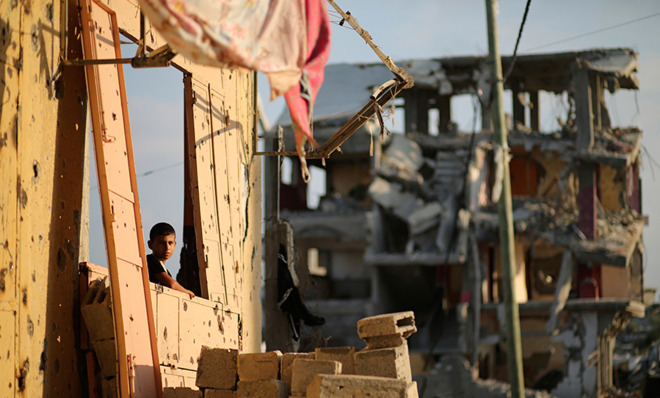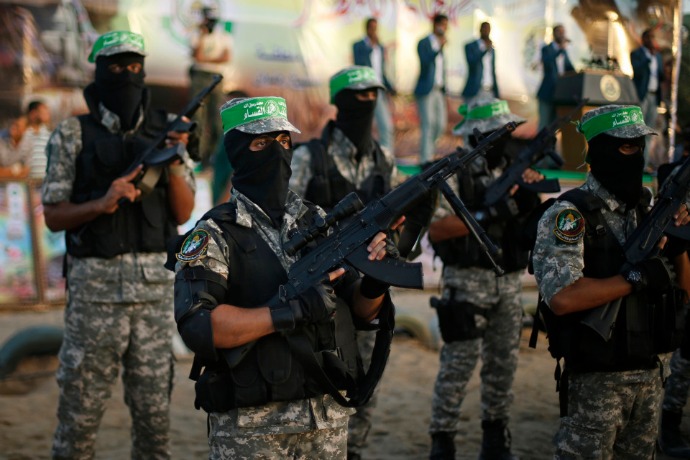Hating Hamas: Life in post-war Gaza
Despite the rosy public opinion polls, Hamas seems to be widely loathed in this coastal Mediterranean wasteland

A free daily email with the biggest news stories of the day – and the best features from TheWeek.com
You are now subscribed
Your newsletter sign-up was successful

After 50 days of shelling, thousands of deaths and $8 billion worth of damage, life in Gaza has returned to a shattered state of quiet. It may take 20 years to repair this beleaguered strip of land just 44 miles south of Tel Aviv. But when I came here this month to see how the area could be transformed, everyone seemed to be muddling through despite the rubble left behind.
It wasn't easy. The truth is there's virtually nothing being rebuilt in Gaza. The grocery stores were dusty and almost bare, with little left on the shelves but cookies and rotten eggs. Salt water poured from the taps whenever I showered, leaving my body sticky and smelling of the sea. Meanwhile, Israeli drones buzzed across the sky like giant mechanical wasps, watching everything below.
Now, as frustration mounts, many Gazans privately admit that the problem is not just the damage from the Israeli bombardment, but also the damage created by Hamas, the Islamic group that rules this coastal enclave.
The Week
Escape your echo chamber. Get the facts behind the news, plus analysis from multiple perspectives.

Sign up for The Week's Free Newsletters
From our morning news briefing to a weekly Good News Newsletter, get the best of The Week delivered directly to your inbox.
From our morning news briefing to a weekly Good News Newsletter, get the best of The Week delivered directly to your inbox.

Call it the double occupation. Despite the rosy public opinion polls, Hamas seems to be widely loathed in this coastal Mediterranean wasteland. Getting a quote, of course, is nearly impossible. In August, the Islamic group not only hung 18 alleged spies in a public square in Gaza City, but also arrested roughly 300 Fatah militants and other dissidents for an unspecified series of crimes.
This crackdown has inflamed people's anger here, but made them even more reluctant to talk. Gaza is so small — just 139 square miles — and people here are so closely knit that it's hard to remain anonymous. Any little detail you reveal to a reporter can compromise your identity and help the authorities — whether Israeli or Hamas — trace back to you and your contacts within a couple of hours.
But if a formal interview is rare, the air of frustration here is unmistakable. Everyone — from grocers to students — offers a brief outburst, a quick sentence, an aside, a look of despair or a knowing glance that shows their desire for a Palestinian spring.
During the war, many hoped Hamas would win, that Israel would lift its blockade and the area's borders would magically reopen. But now many see that Hamas, with its strategy of launching a daily barrage of rockets at southern Israel, actually achieved nothing.
A free daily email with the biggest news stories of the day – and the best features from TheWeek.com
The truce, which the two parties signed on Aug. 26, is little more than a partial reopening of the Egyptian border to bring in building materials and humanitarian aid. Everything else has been postponed for a larger agreement, which remains elusive.
Iframe Code
Not only is the temporary truce identical to the one Hamas signed with Israel after the 2012 war; it's identical to the one Egypt — a country that's also reviled here — proposed after the first week of Israeli airstrikes, when the death toll was 20, not 2,100.
The war in Gaza may have started as one against Israel, but many here say it has also become a civil war, one fought between Palestinian factions, — between Hamas and Fatah and the various groups under their purview. These rivalries have done little but breed incompetence and stagnation. The Palestinian delegation to Cairo, for instance, which is in charge of rebuilding Gaza, doesn't include a single economist or businessman.
Many Gazans still believe that violence is their only hope, that as long as their Jewish neighbors feel safe, no Israeli government will negotiate for a real and lasting peace. But almost everyone I spoke to agreed that firing rockets into Israel — most of which were thwarted by the Iron Dome — makes no sense without a political strategy to end the blockade and the wider conflict.
Now, as Hamas and Fatah are busy arguing with each other and among themselves, yet another generation of Gazans is doomed to know little more than war, violence, poverty and hunger. Thousands have already left for Europe, braving the dangerous journey to countries such as Italy, France, the United Kingdom and Germany. Some have perished along the way. But for those who leave, however, the risk seems far less troubling than staying in a place where foreign donors contribute millions but the bulk of the money goes to weapons for the next impossible war.
Meanwhile, on the other side of Israel, Mahmoud Abbas, the president of the Palestinian Authority, has eschewed rockets for bricks. Thanks to his donors, the West Bank — for all its problems with mismanagement, corruption and Israeli settlements — continues on its path toward legitimate state building. In Ramallah, getting a loan and opening a café is easy, and many refuse to pick up a stone for fear it might scratch their new cars — at least according to Gazans outside the city who both long for and resent Ramallah's bubble of normality.
Iframe Code
The only true normality I felt in Gaza came at sunset, when I stood on the beach, dipped my feet in the water and watched the fishermen cast their nets in the distance. Soon the sky grew dark. And for a brief moment, I could hear nothing but the waves crashing against the shore. It was quiet, almost peaceful.
It was a mirage. Before long, the Israeli spy drones once again buzzed across the sky, and as I walked back to my hotel, I retraced my steps along the beach in someone else's footprints for fear of stepping on an unexploded shell from an Israeli F-16.
This story was originally published on Vocativ.com: Hating Hamas: life in post-war Gaza
More from Vocativ...
-
 Switzerland could vote to cap its population
Switzerland could vote to cap its populationUnder the Radar Swiss People’s Party proposes referendum on radical anti-immigration measure to limit residents to 10 million
-
 Political cartoons for February 15
Political cartoons for February 15Cartoons Sunday's political cartoons include political ventriloquism, Europe in the middle, and more
-
 The broken water companies failing England and Wales
The broken water companies failing England and WalesExplainer With rising bills, deteriorating river health and a lack of investment, regulators face an uphill battle to stabilise the industry
-
 The billionaires’ wealth tax: a catastrophe for California?
The billionaires’ wealth tax: a catastrophe for California?Talking Point Peter Thiel and Larry Page preparing to change state residency
-
 Bari Weiss’ ‘60 Minutes’ scandal is about more than one report
Bari Weiss’ ‘60 Minutes’ scandal is about more than one reportIN THE SPOTLIGHT By blocking an approved segment on a controversial prison holding US deportees in El Salvador, the editor-in-chief of CBS News has become the main story
-
 Has Zohran Mamdani shown the Democrats how to win again?
Has Zohran Mamdani shown the Democrats how to win again?Today’s Big Question New York City mayoral election touted as victory for left-wing populists but moderate centrist wins elsewhere present more complex path for Democratic Party
-
 Millions turn out for anti-Trump ‘No Kings’ rallies
Millions turn out for anti-Trump ‘No Kings’ ralliesSpeed Read An estimated 7 million people participated, 2 million more than at the first ‘No Kings’ protest in June
-
 Ghislaine Maxwell: angling for a Trump pardon
Ghislaine Maxwell: angling for a Trump pardonTalking Point Convicted sex trafficker's testimony could shed new light on president's links to Jeffrey Epstein
-
 The last words and final moments of 40 presidents
The last words and final moments of 40 presidentsThe Explainer Some are eloquent quotes worthy of the holders of the highest office in the nation, and others... aren't
-
 The JFK files: the truth at last?
The JFK files: the truth at last?In The Spotlight More than 64,000 previously classified documents relating the 1963 assassination of John F. Kennedy have been released by the Trump administration
-
 'Seriously, not literally': how should the world take Donald Trump?
'Seriously, not literally': how should the world take Donald Trump?Today's big question White House rhetoric and reality look likely to become increasingly blurred